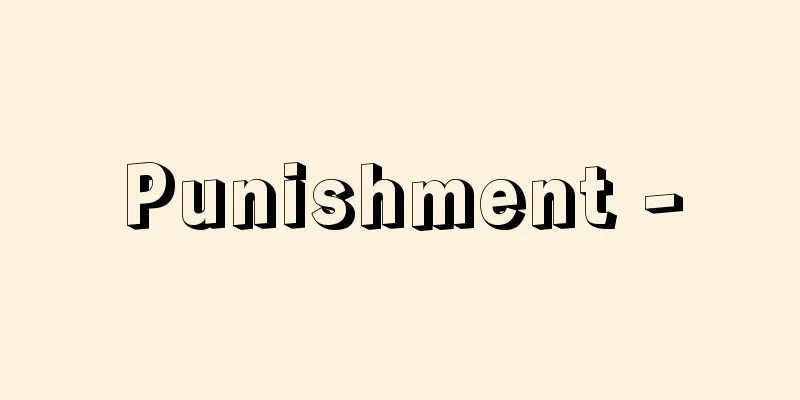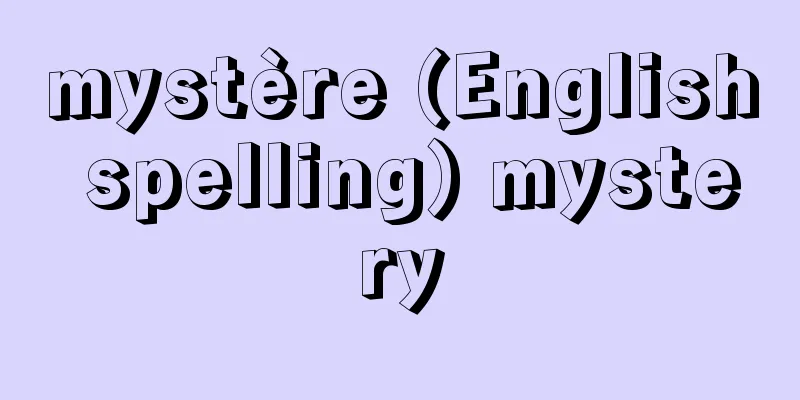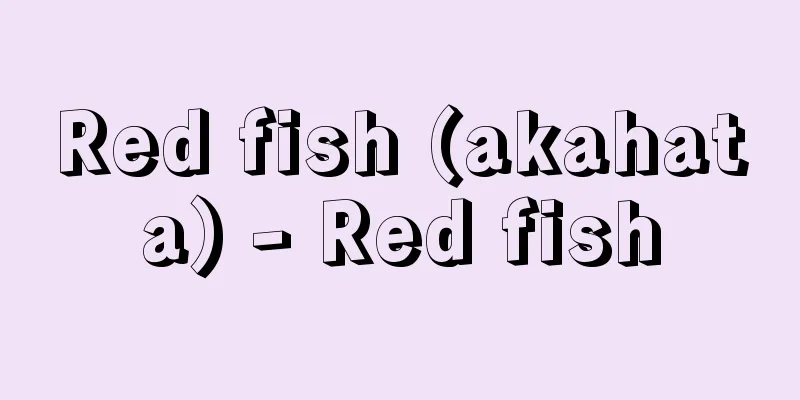Punishment -

|
A punishment given for a crime, or an act that goes against a norm. In legal matters, it is called criminal punishment, but punishment for those who violate religious or moral norms is called divine punishment, Buddhist punishment, etc., and is distinguished from legal punishment. In primitive societies, the distinction between legal and religious punishment was generally not clear, and social sanctions were often given religious significance. In primitive societies, as well as in many ancient societies, punishment was generally accompanied by pain equal to the actual harm caused by the violation. For example, "an eye for an eye, a tooth for a tooth." As time passed, the circumstances of the parties involved were taken into consideration when deciding on punishment, and educational considerations were also made. Usually, the degree of punishment is considered from both the magnitude of the actual harm and the good or evil of the motive. With the development of religion, legal punishment and religious punishment have differentiated. Generally, the highest punishment is the death penalty, but the greatest punishment for religious sins is said to be related to the fate of the soul after death, such as going to hell and suffering eternal life, rather than death itself. Therefore, when persecuted for a religious mission or faith, the legal and social punishment is accepted, supported by the hope that even if one loses life in this world, one will be saved in the afterlife. On the other hand, even if one is spared punishment in this world, if one violates one's conscience, one is plagued by painful feelings of remorse. This is one's own punishment. Psychoanalyst S. Freud called this function of conscience the superego. The superego is an internalized social and ethical norm that strictly monitors the ego from the inside and punishes any violations. This is called guilt. [Shigeru Matsumoto] [Reference] | |Source: Shogakukan Encyclopedia Nipponica About Encyclopedia Nipponica Information | Legend |
|
罪すなわち規範に反した行為に対して与えられる制裁。法律上の事柄に関しては刑罰というが、宗教的・道徳的な規範を犯した者に対する罰は、天罰、神罰、仏罰などとよばれ、法的罰と区別される。 一般に原始社会においては、法的罰と宗教的罰との間の分化が明確でなく、社会的制裁は多くの場合宗教的意味づけを与えられていた。また原始社会だけでなく、多くの古代社会においても、罰は原則として違反行為による実害と同等の苦痛を伴うものとされた。たとえば「目には目を、歯には歯を」といったぐあいである。時代が進むにつれて、刑罰を裁定する場合に、当事者の情状が酌量されたり、教育的配慮がなされたりするようになった。通常、罰の程度は、実害の大きさと動機の善悪との両面から考慮される。 宗教の発達とともに、法的罰と宗教的罰とが分化してきた。一般に最高の刑罰は死刑であるが、宗教的な罪に対する罰の最大のものは、地獄に堕(お)ちて責め苦にあうとか、永遠の生命を失うといったように、死そのものよりも死後の魂の運命にかかわるものとされている。したがって宗教的使命感や信仰信念のゆえに迫害される場合には、この世での生命を失ってもあの世での救いにあずかるという希望に支えられて、法的・社会的罰はむしろ甘受される。だが逆に、この世での罰は免れても、自らの良心に違背した場合には、かえって苦しい自責の念に悩まされる。これは自らが自らを罰している姿である。精神分析学者S・フロイトは、この良心の働きを超自我とよんだ。超自我は内面化された社会的・倫理的規範で、内側から自我を厳しく監視し、違反に対しては罰を与える。それが罪悪感だという。 [松本 滋] [参照項目] | |出典 小学館 日本大百科全書(ニッポニカ)日本大百科全書(ニッポニカ)について 情報 | 凡例 |
Recommend
Grass vine - Grass vine
Please see the "Smilax" page. Source: E...
doctor universalis
…His French name was Alain de Lille. He was born ...
Test tube baby - Test tube baby
〘Noun〙 (Baby is baby) A baby that has been artific...
Wolsey, Thomas
Born: circa 1473, Ipswich Died: November 29, 1530,...
Quamoclit sloteri (English spelling) Quamoclit sloteri
… [Eiichi Asayama]. … *Some of the terminology ex...
Gapon, Georgii Apollonovich
Born: February 17, 1870 in Poltava Died April 10, ...
High tree
〘 noun 〙 A tall tree. In botany, it refers to a tr...
Kaiagabi - Kaiagabi
…A port city on the northwest coast of Gwynedd, n...
Char - Char
A colloquial name for fishermen living in Tsuru, i...
Otorikagaokasei - Otorikagaokaisei
…At that time, the Shogunate's deputies were ...
Cephalonia
…The area is about 780 km2, and the population is...
Gallus lafayetti (English spelling) Galluslafayetti
… [Yoichi Shoda]. … *Some of the terminology that...
Fujiwara no Onshi - Fujiwara no Onshi
Year of death: 8.1.4 of Tenryaku (954.2.9) Year of...
Navy Commissioner - Kaigunbugyo
A shogunate job title from the end of the Edo per...
Square stupa - Kakutoba
Abbreviation of Gorin Kakutoba. It is the same typ...









